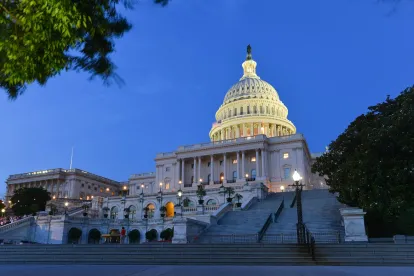The COVID-19 pandemic has reclaimed headlines in America as new cases spike in states that some national health authorities say reopened their economies too swiftly. The US House of Representatives and US Senate are both in legislative session this week in advance of the Independence Day work period, but bipartisan talks to hammer out the next federal coronavirus response bill have yet to begin. Talks are expected to commence next month as policymakers are driven to the negotiating table by the impending expiration of the enhanced unemployment benefits provided for displaced workers by the March 27 CARES Act.
Topics covered today include: tax and economic development, health, government oversight and US states development.
Via Bloomberg Government:
A surge in coronavirus that has seen record numbers of new US cases in recent days is likely to continue for weeks after states moved too soon to reopen their economies, two of the country’s leading public health experts said Sunday. . .
US coronavirus cases now exceed 2.5 million, with [more than] 125,000 reported fatalities – in both cases the world’s highest. The country’s inability to control the spread of the virus seems likely to result in US citizens being banned from traveling to Europe, for example, where cases are down in some cases 90% from their peak.
A move by the EU to restrict travel from the US was the inevitable result of the continuing spread in America, [Former US Food & Drug Administration Administrator Scott] Gottlieb said. Growing restrictions on travel within the US could come next, he said.
A CBS poll released on Sunday showed 62% of those surveyed said US efforts to deal with the virus are ‘going badly,’ up from 57% in early June. The percentage who said President Donald Trump was doing a ‘good job’ on the virus was 41%, the lowest of five polls taken since late March.”
The House is scheduled to vote this week on a US$1.5 trillion infrastructure measure that would fund an array of national projects and initiatives. The House Committee on Rules lists 367 amendments that have been offered to the bill. The House is expected to approve a final version of the infrastructure proposal later this week, sending the package on to the Republican-led Senate. The House passed a US$3 trillion pandemic response bill, the HEROES Act, on a party-line vote in May.
The Senate has ignored the HEROES measure and is likely to take a similar approach with the infrastructure legislation, though elements of both bills are likely to be factors in the eventual discussions between the two parties when they begin working to forge an agreement on additional COVID-19 relief that can be sent to President Trump and signed into law. The Senate this week will begin consideration of its version of the annual National Defense Authorization Act (NDAA), the measure setting policy priorities for the Pentagon.
The Department of Labor’s Bureau of Labor Statistics will release its monthly jobs report on Friday morning, providing the latest snapshot of the employment situation in America months after the widespread lockdowns that brought the country’s economy to a halt this spring. Last month’s report showed a marked decrease in the overall unemployment rate as a result of states beginning to reopen their economies, fueling optimism that a robust recovery was already underway and bolstering GOP arguments for delaying action on the next federal COVID-19 response bill.
Tax and Economic Development Updates
Yesterday, the Federal Reserve released details about its almost US$7 billion in corporate bond and exchange traded fund purchases to date – including information about the sectors and individual firms which assets it purchased. Additionally, the Federal Reserve Bank of New York released a list of the almost 800 companies which bonds it currently has plans to purchase. Specifically, “[t]he Secondary Market Corporate Credit Facility (SMCCF) will initially purchase corporate bonds to create a corporate bond portfolio that tracks a broad market index developed for the SMCCF (Broad Market Index). The Broad Market Index is intended generally to track the composition of the broad, diversified universe of secondary market bonds that meet the criteria specified in the Term Sheet for Eligible Broad Market Index Bonds, subject to generally applicable issuer-level caps specified by the Term Sheet. It will be recalculated at least every 4-5 weeks, and the list of bonds that are eligible for purchase will be refreshed more frequently to add or remove those bonds that newly meet or no longer meet the eligibility requirements.”
Additionally, Bloomberg is reporting that “[i]ndustries smacked hard by the pandemic shutdowns hope to obtain relief from new tax bills that could arise as a result of restructuring or otherwise having debt canceled.” According to the report, ideas currently under consideration include: (1) expanding and accelerating tax deductions for domestic oil companies; (2) amending Section 38 of the tax code to temporarily make its tax credits refundable on an elective basis; and (3) denying COVID-19-related financial assistance and other incentives to companies that have undergone a tax inversion.
Health Updates
Top Administration officials hit the airwaves on Sunday to defend actions that have been taken while also pressing the importance of behaviors to reduce the spread of COVID-19. Department of Health and Human Services (HHS) Secretary Alex Azar told NBC’s “Meet the Press” that the agency had “more tools than we had months ago,” and that fatality rates and hospitalization rates are the lowest they’ve been in two months. However, the Secretary warned “the window is closing” to curb the spike in cases. He also said, “we have to act, and people as individuals have to act responsibly. We need to social-distance. We need to wear our face-coverings if we’re in settings where we can’t social-distance, particularly in these hot zones.” Vice President Mike Pence, on CBS’ Face the Nation, explained that the increase in numbers may be due to “a combination of increased testing” and also potentially an “indication that as we’re opening our economy up, that younger Americans have been congregating in ways that may have disregarded the guidance that we gave on the federal level for all the phases of reopening.” Pence said people “should wear masks whenever social distancing is not possible” and “wherever it is indicated by state or local authorities.” Pence and Azar’s comments add to the at-times confusing messaging from the White House on the importance of wearing masks.
Albert Bourla, the Chairman and Chief Executive Officer of Pfizer Pharmaceuticals, announced during a session of the Milken Institute’s “Summer Series” that the company may have a coronavirus vaccine ready for distribution by October 2020. Pfizer is expected to begin Phase 3 trials for its vaccine candidate in July. While the sites will be located around the world, the majority will be in the US, including the current hotspots of Florida, Arizona and Texas. If the vaccine proves to be safe and effective, it could receive approval from the Food and Drug Administration in September, with hundreds of millions of doses of the vaccine available by the end of this year and one billion by 2021, according to Bourla. The CEO also said that the price of the drug will not be “based on the value because obviously it’s going to be very high” but rather “prices that already exist for other vaccines.” He added that the company would try to provide discounts due to the large volume needed. Concurrently, Anthony Fauci, Director of the National Institute for Allergy and Infectious Diseases, told CNN that he would “settle” for a COVID-19 vaccine that’s 70-75% effective. Dr. Fauci also expressed concerns about coronavirus vaccine education, saying it is “not going to be easy.”
Meanwhile, HHS will ship what is left of its federal supply of remdesivir today. Gilead, the drug’s manufacturer, donated 940,000 vials of remdesivir to HHS, enough to treat about 120,500 patients, and HHS has allocated the drug to states for distribution to hospitals. Initially, HHS had planned to set-aside 10% of the drug for a stockpile, but instead distributed the remainder to current hotspots. It is unclear whether Gilead plans to donate further supplies or will begin charging the federal government for its acquisition.
As previously reported, the Administration revealed plans to close the remaining 13 federally supported testing sites around the country by June 30. On Friday, HHS reversed course on the five sites in Texas and announced it would extend federal support for another 14 days. Assistant Secretary for Health Brett Giroir also said in a statement that HHS will provide additional resources to help Texas eventually take control of those five COVID-19 testing locations.
Oversight Updates
Last Friday Representative James Clyburn (D-SC), Chairman of the House Committee on Oversight and Reform’s Select Subcommittee on the Coronavirus Crisis, led representatives from Texas, Colorado, Illinois, New Jersey, and Pennsylvania in demanding that HHS reverse its decision to abandon testing sites in these states per the Administration’s announcement. In a letter to Secretary Azar, the lawmakers urged the federal government to “dramatically increase testing—not abandon testing centers.”
On the same day, the Select Subcommittee held a hearing with the head of the Government Accountability Office (GAO), Comptroller General Gene Dodaro, on the report released Thursday. His testimony echoed the report’s findings, among them that: (1) the GAO had not received specific loan data from the Small Business Administration on the Paycheck Protection Program (PPP); (2) the data provided by the Centers for Disease Control and Prevention was unreliable; and (3) the federal government’s efforts to procure personal protective equipment were poorly coordinated and inadequate. Dodaro emphasized that “the data is essential” for the GAO to be able to audit the government’s coronavirus response efforts, including to “carry out any potential risk analysis” of the PPP, which “already [shows] some indications of fraud.”
Another category of PPP loan recipients that may be subject to scrutiny are charter schools. The San Francisco Chronicle reports that charter schools in the Bay Area received tens of millions in PPP loans, while at the same time receiving state and private funding. By contrast, public schools are not eligible for PPP loans.
Additionally:
-
Senators Elizabeth Warren (D-MA) and Edward J. Markey (D-MA), along with Representative Ayanna Pressley (D-MA), wrote to Massachusetts Governor Charlie Baker (R) requesting an independent investigation into the COVID-19 outbreak at the Massachusetts Chelsea Soldiers’ Home, where 31 residents died.
-
There are reports that a company owned by President Trump’s economic adviser (and former Reagan economic adviser) Art Laffer received almost US$20 million in PPP loans, even though he was among conservative leaders who have urged President Trump and Senate Majority Leader McConnell to halt coronavirus relief spending, arguing that “runaway government spending is the new virus afflicting” the economy.
State Updates
As the number of COVID-19 cases continue to rise across the country, governors are dealing with conflicting voices on mask wearing and re-openings. Daily, they are receiving mixed messages from local municipalities, state health officials and the federal government creating havoc and high tensions for the public.
Nevada Governor Steve Sisolak (D) has promoted mask wearing but initially resisted making it a requirement, saying he worried the rule could create a backlash for businesses trying to enforce the order on customers. Last week, the governor decided to impose the mandate, saying it was necessary to protect people and keep businesses open.
Decision-making on the immediate next steps states must take has shifted into higher-gear as reported cases of the virus continue to rise and governors must consider whether to continue re-openings in their state, pause or backtrack on loosening restrictions.
Texas and Florida, have begun reversing some of their steps intended to reopen their economies. Florida has re-closed its beaches, parks and barsin recent days and Texas has re-closed bars and limited restaurant capacity as of late last week.
South Carolina’s top infectious disease expert last week said that a statewide requirement for people to wear masks indoors would be a great help. The statement appears contradictory to the public stance of Governor Henry McMaster (R), who continues to say a mask requirement would be challenging to enforce, calling it “ineffective and impractical.”
Colorado Governor Jared Polis (D) signed an executive order in early June giving businesses the right to refuse service to customers not wearing masks. As a state that is surrounded by other states now experiencing extreme surges in positive virus cases, the governor last week unveiled a public service video from the Colorado Tourism Office encouraging visitors to show care, not only for the sites they are visiting in the state but also for the people living in those communities.
Meg Gilley and Genevieve Bresnahan contributed to this article.







 />i
/>i

